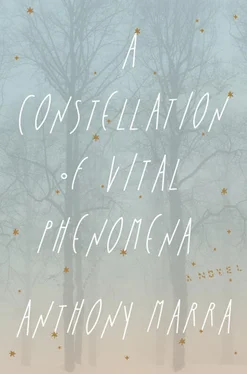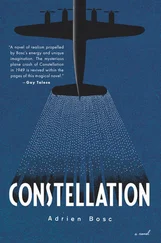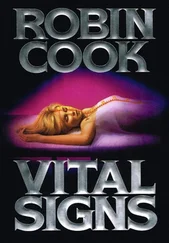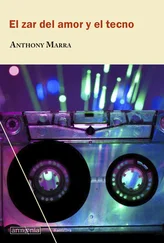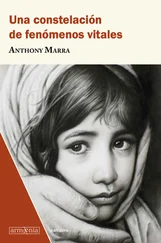“It’s too bad you can’t amputate a head.”
“You can. It’s called a decapitation.”
Maali noted it excitedly on her clipboard.
“We’re all working trauma today,” Deshi said.
“What if there are deliveries?” Natasha asked.
“Then you’ll do them, Natashechka. It doesn’t take much to deliver a child. The mother does most of the work.”
The first casualties arrived a half hour later; red heat radiated from their skin. Natasha disinfected the ropy ends of a calf when Deshi came calling. “We have a delivery. Go.”
The patient lay gowned and supine on the maternity ward bed. Her face throbbed against the white sheets, as flushed and anguished as those four floors below. Two men stood beside her, each holding one hand. She recognized the cleft in the older man’s chin, but now wasn’t the time for pause, for reflection; now was the time to act. She stood between the woman’s pale open legs, trying not to look down.
“The contractions are three minutes apart,” the younger man volunteered. He spoke with the halting formality of an outsider.
It was all she needed in order to remember what to do. “Lasting how long?”
He didn’t know. Sweat grew heavy on the woman’s forehead and trickled toward her temples. After washing her hands to her wrists, rubbing sanitizer to her elbows, she snapped on a fresh pair of gloves. Another contraction came; they all heard it.
“Do you feel like you have to shit?” she whispered into the woman’s ear, afraid of embarrassing her in front of her husband.
The woman nodded.
“What did you ask?” the younger man asked. “Is she okay?”
“The child is in the birth canal, putting pressure on the rectum, that’s all.” These people knew nothing of her, and she drew enough confidence from what they did not know to keep her voice level. They didn’t know that her name was Natasha; that she had performed only two solo deliveries, one and three weeks earlier; that six months earlier, as she detoxed in a Rome psych ward, God had pulled her through a needle’s eye so narrow that this thread in front of them was all that remained.
She told the woman to lift her pale little legs, place her feet in the stirrups, and the woman did. She pulled the woman’s dress into a crumpled hoop around her stomach. They thought she knew what she was doing and she made their faith hers.
“My chest hurts,” the woman said.
“You need to breathe.”
“My eyes hurt,” the woman said.
“You need to blink.”
She set two pillows on the floor, beneath the woman’s open legs, just in case. The vise of the woman’s grip crushed the older man’s fingers to squirming scarlet tendrils. “I’ve seen you before,” Natasha said, but was swallowed within the woman’s wail. “Push,” Natasha said. “Push.”
A mat of damp hair ringed by pubic curls began to crown.
“Gently,” she said, extending her hands as the mat of hair became a head. “Take deep breaths. Slow breaths. Imagine you are inflating a balloon. Your breaths are slow and deep. Blow through your mouth at the most painful point of each contraction. Try to whistle.”
She steadied her hands beneath the crowning skull. Instinct told her to palm the back of the child’s head so its first sensation was of warmth and comfort, but she kept a finger’s width between the child’s skin and her own. Maali had warned her never to touch a child’s head before seeing its face; doing so could cause the child to inhale amniotic fluid. But it wasn’t the child who gasped, it was Natasha as she watched the damp forehead emerge. The birth canal sheathed every slip of skin as the mother slid her child into life. Its little eyes didn’t move. Far away, the mother emptied her lungs in an unshaped melody. They all inhaled her whistle.
“The head has come out,” Natasha announced, trying her hardest, for the sake of professional decorum, to stifle the smile widening across her face. The mother pushed and the room hushed, dampened, narrowed by her exertion. The shoulders stuck. With the most tender turn of her gloved hands, Natasha rotated the child’s head so its lids looked into the fleshy pale of the mother’s thigh. The right shoulder slid through. She lifted the child’s head and when the mother’s next whistle pushed out the left shoulder, the rest glided into her hands like an afterthought.
She lifted the umbilical cord over the child’s face, and the warm wet weight of the head pressed to her palm. She angled the child toward the floor. “A girl,” she said. The child opened its eyes and a sharp chill ran through her to know that hers were the first hands to hold the girl.
“She doesn’t look right,” the father said.
Natasha rubbed the girl’s back through a towel, then tilted her head to open the airway. She stroked the girl’s nose, dried the girl’s mouth, suctioned residue through a plastic syringe, tickled her feet, but still the girl hadn’t cried. Should she run downstairs for help? Could she perform CPR on a newborn? She pushed her fingers into the child’s soft, soggy soles, and begged them to kick back. At the ends of her feet the protruding toes seemed in error, so curled and delicate they might sink back into the doughy flesh. These are the feet of a human being you brought into the world. She will not die.
She didn’t. Lips drawn to the pink edges of her toothless gums. A sharp gulp.
“She’s breathing.”
“I can hear,” the father said. The girl wailed. “She breathes like her mother.”
She placed the girl on the mother’s bare skin. The mother stared through a frame of damp hair and recognized her daughter; they were both breathing. Pink liquid trickled from the girl’s mouth, striping the incline of her mother’s still swollen stomach. With a fresh towel Natasha wrapped the two together.
“You should start nursing as soon as you feel able,” Natasha said. She didn’t need to borrow their confidence. It was hers. “It will help the placenta come out and stop the bleeding.”
The mother nodded weakly, happily. Her voice was unfamiliar when she spoke. Natasha had only heard it in screams. “This is my daughter?”
“Yes,” Natasha said, finally allowing herself a smile. “She’s yours.”
The older man approached as she washed her hands under the sputtering tap. There was much yet to clean, but first, her hands. He thanked her.
“The mother did most of the work,” she said. In his wrinkles she recognized his face as she might a photograph crumpled and flattened. “I’ve seen you before.”
“Have you been to Eldár?”
In a truck, with five other women. “In passing.”
“What about the city university? I taught there. Or the Café Standard? I enjoyed their bebop nights. Do you like bebop?”
“I don’t like trumpets.”
“But what if a trumpet is playing the music you like?”
She thought of loose screws trembling on the Nightclub dance floor.
“The music I like can’t be played on a trumpet,” she said.
“If it can’t be played on a trumpet, it’s not music.”
“My name is Natasha,” she said, smiling.
“Khassan Geshilov.”
Repeating the name aloud, she saw the black-and-white dust jacket photo. “I’ve read your book.”
He gave a bashful laugh. “You’re the one?”
“It ended before the Russians arrived. A stupid decision, if you ask me.”
“If only you had been my editor! Origins of Chechen Civilization ,” he said fondly, as if he had also forgotten the title. He turned to the boarded windows. “This is the whole city, isn’t it?”
“As much as can be seen from the window.”
He strolled the ash-shaded streets and verdant leaves, reading the city so he might later remember. He lingered at an intersection between City Park and the university library, hesitated, then pressed his finger into the street. “The love of my life was nearly killed by a bus here. She had been following me, and I only found out then, with the screech of bus tires.”
Читать дальше
